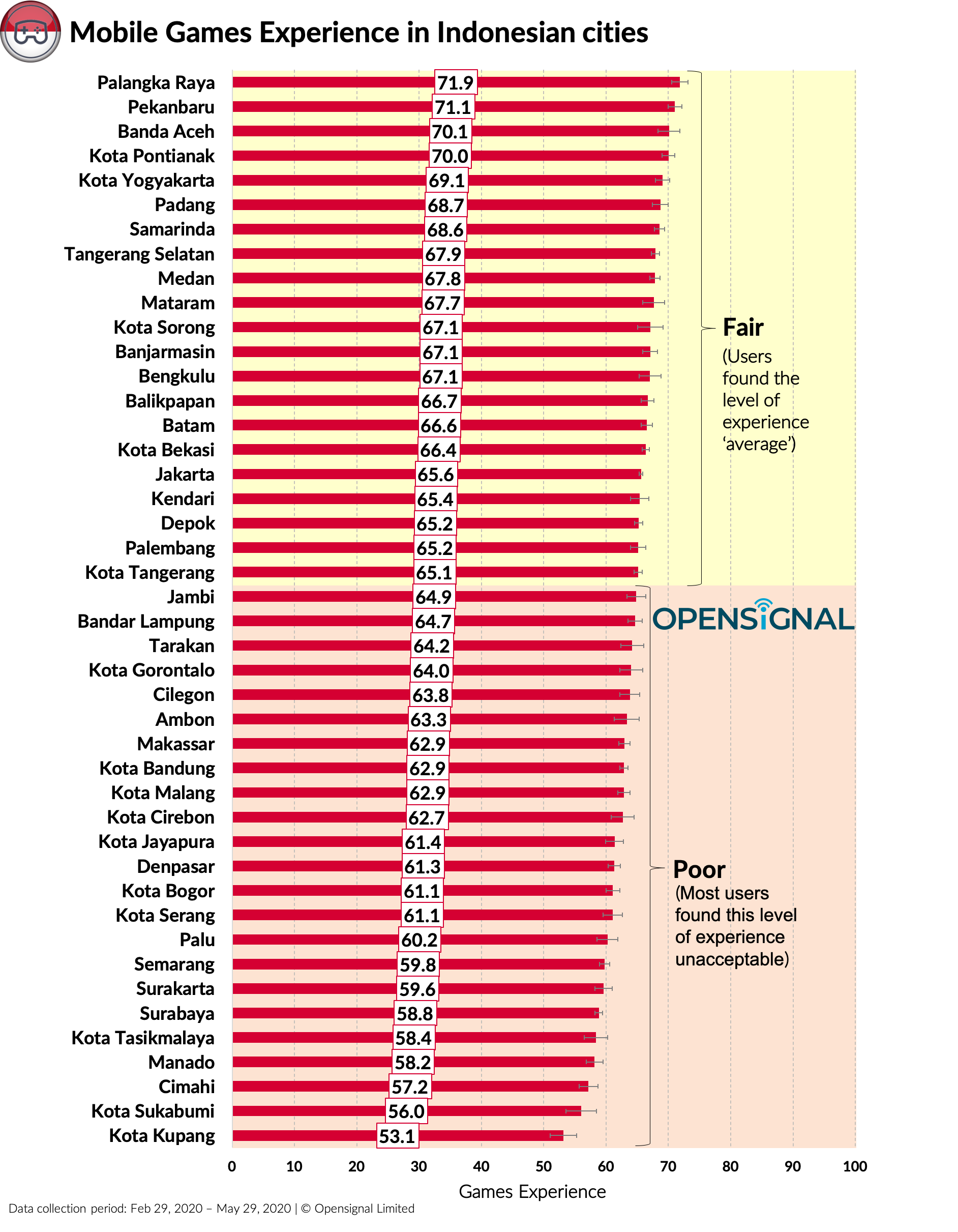Indonesia is the largest mobile games market in Southeast Asia — both by players and by revenue. Mobile gaming's low-cost barriers and on-the-go convenience, driven by increasing affordability of smartphones and ubiquitous cellular networks, has made it a dominant gaming platform in the country. And with the rising popularity of Esports among the largely young population, Indonesians are playing multiplayer mobile games online more than ever. But how good or bad is the gaming experience on Indonesian cities’ mobile networks?
Mobile Games Experience in Indonesia ranges from Poor to Fair
In this analysis we combined the performance of all national operators across different network technologies in 44 of Indonesia’s largest cities to see how they compared on our unique measure of Games Experience. We based our findings on a combined score (on a 100-point point scale). Our analysis looks at real-world games experience perceived by users across some of the most popular real-time multiplayer mobile gaming genres such as Battle Royale and MOBA games of which Call of Duty, PUBG, Arena of Valor and Braw Stars are examples.
At the top of our list for Games Experience are Central Kalimantan’s Palangkya Raya (71.9), Riau’s Pekanbaru (71.1) and Banda Aceh (70.1) — all three of which have placed in the Fair rating category. This means that users in these three cities found the experience “average”, with the majority of players noticing a delay between their actions and the outcomes in the game.
This was also the case for our users in a further 18 cities, which include some of the highly populated urban centres. While Banten’s Tangerang Selatan (67.9) and North Sumatra’s Medan (67.8) were among the top 10, West Java’s Kota Bekasi (66.4) appeared in the 16th position, followed immediately by Indonesia’s capital Jakarta (65.6). And at the bottom of our list in the Fair category were West Java’s Depok, South Sumatra's Palembang and Banten’s Kota Tangerang, with scores just marginally above 65 points. It was noteworthy that Kota Yogyakarta was the only Javanese city that made it to the top five.
On the other hand, with scores between 40-65, users in the remaining 23 cities perceived a Poor Games Experience, which means for many of our urban users, playing multiplayer mobile games over cellular networks is challenging — the level of experience is unacceptable and marred with increased delays as well as lack of controllability in gameplay. At the top of our list in the Poor rating category was Jambi (64.9), while large cities like West Java’s Kota Bandung (62.9) and East Java’s Surabaya (58.8) were further below in the 29th and 39th slots, respectively. Lastly, at the bottom of our chart was East Nusa Tenggara's Kota Kupang (53.1).
This shows that games experience in Indonesia has ample room for improvement, and for a majority of users, playing multiplayer games using mobile networks can be challenging at times. But what factors will contribute to improvement? There are a range of technical network characteristics that together affect the Games Experience, of which three key factors are:
- UDP Latency, i.e., UDP(User Datagram Protocol) packet delay, which characterizes the responsiveness of the network connection, for time-sensitive applications, especially mobile gaming.
- Packet loss, i.e., the proportion of data packets that never reach their destination. In a game, this means the player’s actions may never take effect, or that the state of the game stops being communicated back to the player. This hurts a player’s ability to enjoy a game, as well as making it harder to win.
- Jitter, i.e., variability of the arrival time of data packets. All data packets take time to travel between locations — for example between a player and the game server — but often the amount of delay varies between packets. Higher jitter levels are often a sign of network congestion, caused by routers struggling to pass on data packets.
Visualizing how network conditions affect mobile gaming
High packet loss High UDP latency or jitter
There is often a non-straightforward relationship between these three inputs and their effect on a player’s experience. But the lower the level of these three factors, the better will be the games experience.
In Indonesia, 85% of internet users engage in mobile gaming, and with the growing popularity of competitive Esports events, Games Experience is becoming increasingly important for Indonesian consumers, hence any operator who provides greater Games Experience definitely holds an advantage.
Check how your internet connection affects your favorite mobile gaming apps with Meteor, available for iOS and Android.
Opensignal Limited retains ownership of this insight including all intellectual property rights, data, content, graphs & analysis. Reports and insights produced by Opensignal Limited may not be quoted, reproduced, distributed, published for any commercial purpose (including use in advertisements or other promotional content) without prior written consent. Journalists are encouraged to quote information included in Opensignal reports and insights provided they include clear source attribution. For more information, contact [email protected].
